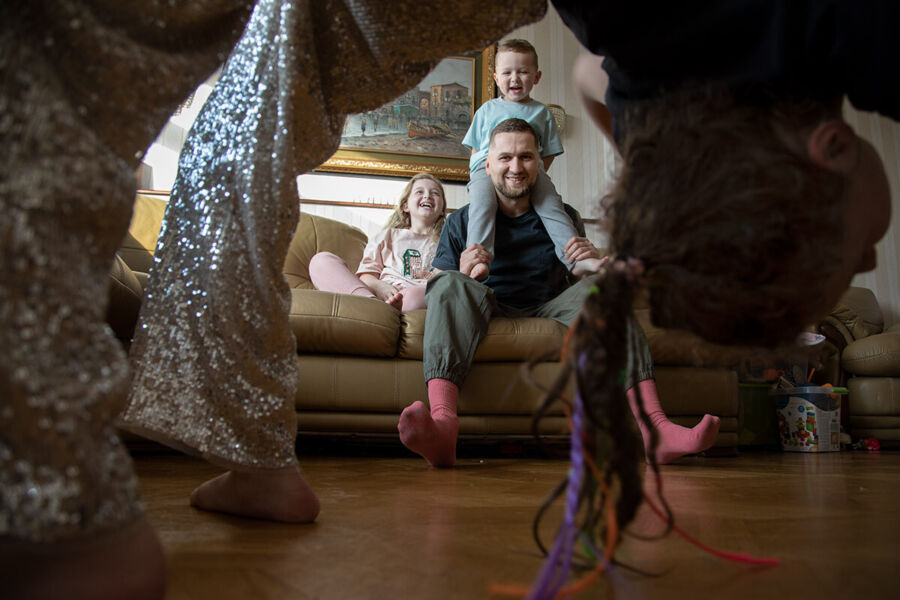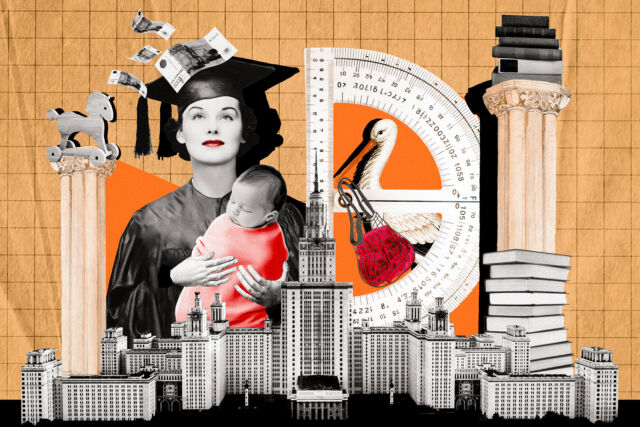According to surveys, 27% of Russian men are prepared to take parental leave. However, the Social Insurance Fund of the Russian Federation estimated that only 2% of all parents who took parental leave were men. Some simply don’t know this option is available for them. Others don’t use this opportunity because it is more beneficial for them to keep working—women get less money.
Alexey Pechenin has a large family. He was the one responsible for making money after his two daughters were born. And his wife was responsible for household chores. After having a third child—a boy—Alexey realized he didn’t have enough time for his children. Besides, his wife started feeling like she couldn’t manage it all on her own. Alexey told Glasnaya about quitting his job to spend time with his children, how Russian society treated large families, and what was the most difficult part about active fatherhood.
“Things started happening so quickly”
When we had our first baby, I didn’t feel like I had to change my lifestyle at all. I kept working and my wife took care of our daughter. I took a few days’ leave but nothing more. It seemed like my wife had enough energy to handle everything, I didn’t participate much.
About a year later, my wife got pregnant again. All our friends were talking about labour companionship at the time. I didn’t attend our first child’s birth—they wouldn’t let me anyway because they did a C-section. During my wife’s second pregnancy, we talked about the things that were worrying her a lot. She said she was scared. We started taking classes where men were taught to participate in labour. We decided to go through the labour process together, it was important for both of us. She tried to give birth naturally for a long time. She had the first contractions at 8 am and she was trying to give birth naturally till 11 pm. But in the end, they performed a C-section. I saw my daughter. I was staying with my wife. And then, things started happening so quickly… I don’t even know where to begin.
By the time our second child was born, I had changed my job. I quit the one I had been doing for 6 years. A year after, I changed my job again—I started working for SAP, an international company producing corporate software. It was quite stressful for me: a new job, new people, I had to prove myself somehow and spend a lot of my time and energy. The company required their employees to be highly engaged in work. And you could earn a lot there.
I had to build a network at my new job—it also took some of my time. I had a lot of business trips. My wife Lena had to take care of two kids and it turned out to be difficult. She started getting sick a lot, her chronic diseases got worse. Our flat was relatively small. My grandmother lived nearby. On the one hand, she helped with housework—with cooking and other things. On the other hand, my wife and my grandmother kept having latent conflicts, they held a grudge against each other. So the granny was giving us a bit of a hard time.
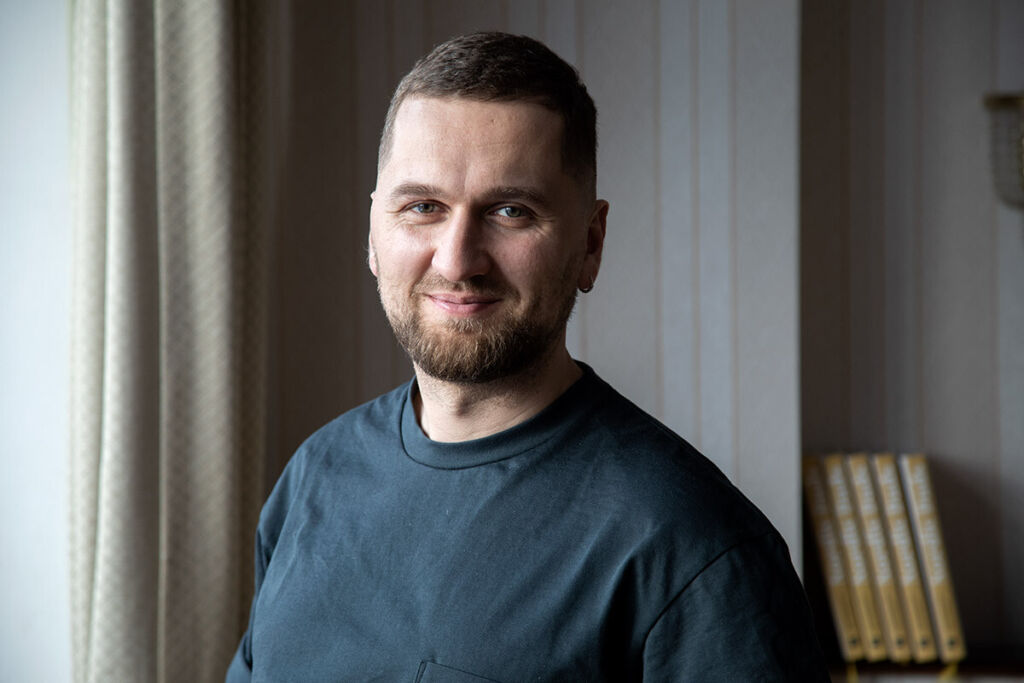
We visited Sochi in 2015. And we liked it so much that we had an idea to move there for a while. So we did it. But I was still on my previous job and had to fly back and forth. I had my flights to Moscow on Mondays at 6 or 4 am. And I came back on Thursday or Friday nights. We kept living like this for an entire year, and, to be honest, it was hard for me. I felt bad mentally and physically—I had to spend a lot of time without my family.
We decided to move back to Moscow, it was time to move on. It was hard to earn good money in Sochi. So we came back to live together. And right before our decision, we found out about the third pregnancy. I didn’t see it coming—just like with the second one.
Mindfulness
When our first two kids were born, I was lacking mindfulness. It was a gradual process—getting a job, getting married, having children… I had this behavior model in my head: men go to work, women take care of children at home. I lived according to that model and it was quite comfortable, I didn’t think much.
Our second daughter was restless because of her strong allergies. She used to wake up a lot and scratch herself. When she was still an infant, it was really exhausting for us, especially for my wife. She was breastfeeding our daughter till she turned three. So it was my wife who had to deal with most of the difficulties.
I think she didn’t really ask me to help her with our first baby. Now that we discuss these topics, she says I simply didn’t want to listen to some of her complaints. Or considered them not serious enough. You know, like, everybody complains about things from time to time. Some are having a hard time at work, some at home. I didn’t pay much attention to it.
When the child is still small, you have to deal with interrupted sleep. I slept fine because I had to go to work the next day. My wife was the one to get up and check on the baby during the night. It might have been one of the reasons for our relationship crisis. I also started doing triathlons at the time and it only added to our problems. I was spending all my time at work and on business trips, and on top of that, I started training instead of being with my family and helping.
I attended my third child’s, son’s, birth. When he was born,
it turned out that having three children wasn’t 1.5 times harder than having two. It was at least ten times more difficult, especially when all three of them were little…
Raising two children is hard, raising three is a disaster. You don’t have time to do many things. There are ways to deal with it, for example, hiring a babysitter. But we aren’t mentally ready for it. How can you leave your children with a stranger? We still don’t have a regular babysitter that would come every day — only the one that stays with kids for a few hours sometimes.
After my son was born, I started thinking about the ways to overcome the relationship crisis. My job required even more time, the pressure I was under at work kept growing. So I started talking to a coach to find out what I needed to do.
“Well, I quit then”
When I shared my problems with friends, one of them said, “Why don’t you take parental leave?” I thought it was an interesting idea. But my mindset at the time was telling me it wasn’t a manly thing to do. If I went there and told them I was taking parental leave, they wouldn’t understand… Do you know what I mean? They would think I bailed on them — that I failed my company and my bosses.
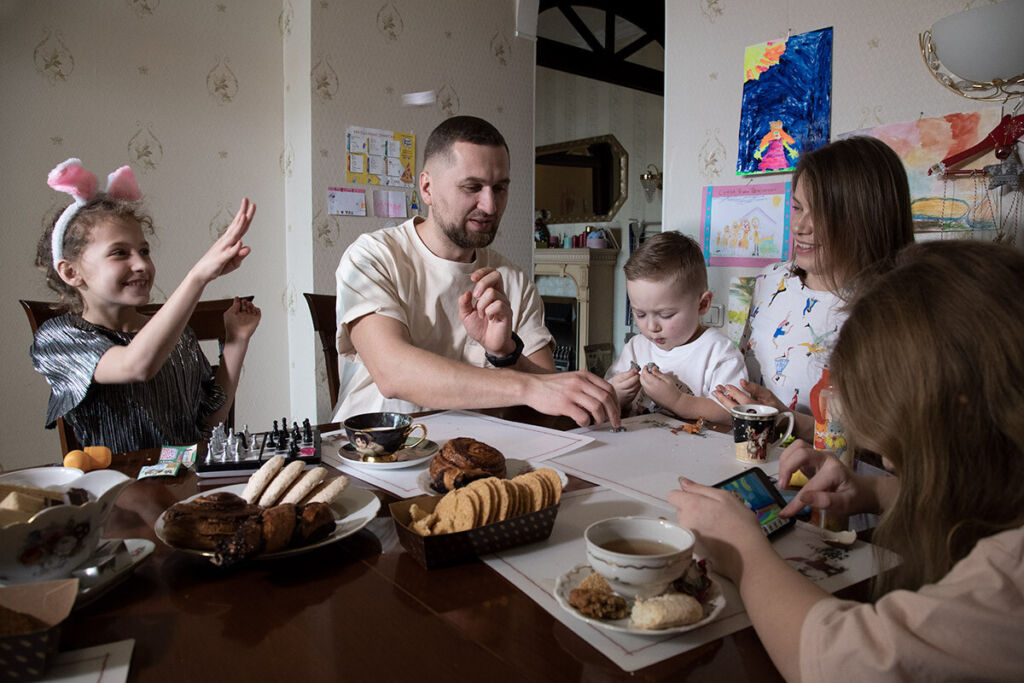
The thing is, if you want to take parental leave, someone still has to do your job. So a company needs to find a replacement for you. But the leave takes, say, half a year. And hiring someone for such a short period doesn’t make sense. If I was a company executive and some guy came up to me and said he wanted to take parental leave, I would consider it challenging. I would have to change the financial plan. And it’s a lot of work. So I was a bit nervous about asking for a leave. But in the end, I did it. I asked for unpaid leave, to be precise. I didn’t even consider asking for parental leave because my wife was unemployed and I thought I wasn’t allowed to have one. They told me I should ask the boss. The latter said, “Absolutely no.” So I replied, “Well, I quit then.”
You know, the job was paying well enough to compensate for the energy I was spending on it. But my coach taught me to always listen to your inner voice, not to be afraid, to understand your career and life goals. I realized that job and money weren’t my priority at that time. I had savings, so I could afford quitting and having a comfortable life for some time. And most importantly, I didn’t feel ok physically because I was never at home. I wanted to be with my family but I couldn’t—I had to go to work. I reached the breaking point: I realized I wasn’t afraid anymore. I didn’t know what could happen next but I wasn’t scared, I was ready to take that step. I informed the company that I decided to quit. I couldn’t do it straight away though—there were many tasks I had to finish. I spoke to my boss in June, and we agreed to discuss it again in September. In September, we agreed to talk about it at the end of the year… Long story short, I quit in May.
I can’t really blame the executives. I understand their point of view. The thing is that we are not accustomed to such things in Russia. There were a lot of men with large families, or with at least two kids. And nobody ever thought about taking parental leave. It was considered wrong. We never heard anyone saying how great it was that a man took parental leave. Even if it actually happened, everybody kept it low-key. We live in a patriarchal society and the company simply couldn’t support things like this. And the employees didn’t support it either—even those who had a lot of children
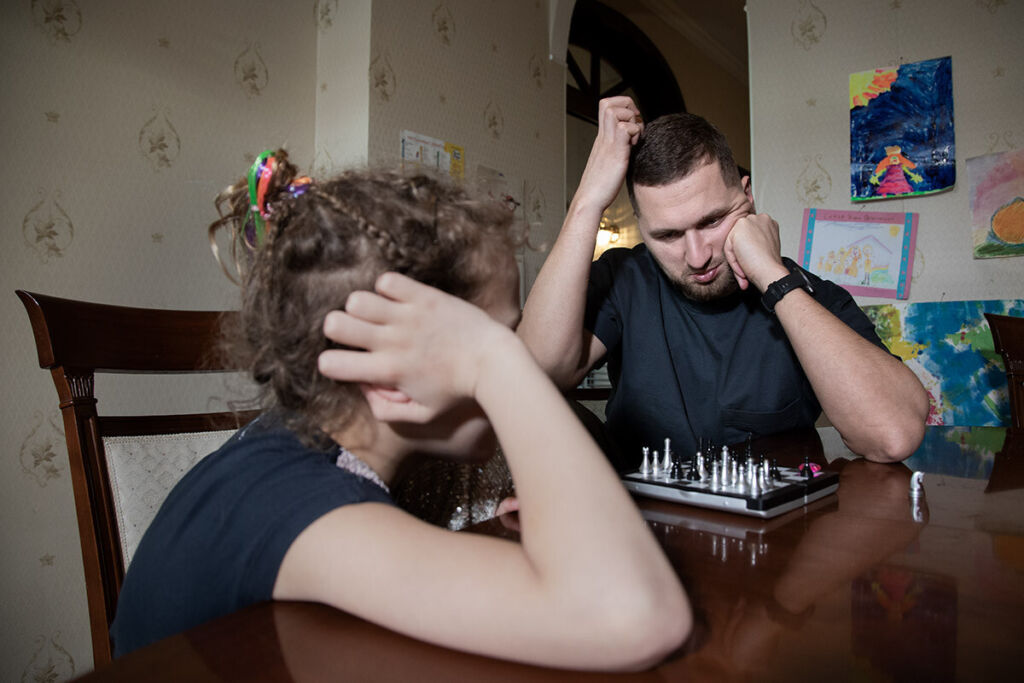
It happened only later that I found out I could apply for parental leave even though my wife was unemployed. It might seem like I’m sitting here shifting responsibility to the company but I understand I also didn’t do enough. I could have come to the personnel department and told them I wanted to take parental leave. But I didn’t know that was an option and I was too ashamed to ask. And it’s frustrating no one hinted that I could do it, especially given the company I worked for was German. Every second man in Germany takes parental leave. But nobody told me about it. So I had to quit. I don’t regret it though.
Nordic Dad
We went on a trip around Europe after I resigned. It was our lifelong dream. One of our friends moved to Norway a long time ago. She is married with three kids. And she told us that as soon as a baby turns 6 months old, you have to start working again. And your child goes to daycare. I remember I really liked her story. And later, I learnt more about this Scandinavian system: a father can take parental leave easily. I’m aware that other European countries have the same thing, but Scandinavians have been practicing it the longest. Besides, Scandinavia might be the most prosperous region in the world, that’s why they managed to implement it so quickly.
Then my friends introduced me to the guys that were writing a book about Scandiavian fathers on parental leave. They decided to include Russian families as well. They weren’t sure about me because my story didn’t really fit—I didn’t actually take parental leave. But in the end, they wrote about me in their Nordic Dads, too. That book helped me learn that there were support programs for fathers and it’s been a long time since they opened them. I read real people’s stories and they really impressed me, of course. It changed the way I look at many things now.
I spent more than a year with my family. My wife and I shared domestic chores that used to be only her responsibility. I got really involved in my son’s upbringing, in living with a small child. Something remarkable happened the other day:
my son wakes up at night sometimes. And once, he woke up and came up to me, not to my wife. He said, “I want daddy.”
It wasn’t the same with my older kids because they spent the majority of their time with mom. And their mom is everything to them. I don’t think it has anything to do with him being a boy. It’s just that I spent more time before he turned three with him. It is a very important stage of development.
“Growing up, I didn’t have a male role model”
Everything that was happening in our lives got me thinking about my own childhood.
Before my parents’ divorce, there were four people in my family—mom, dad, granny, and I. Our small apartment had two interconnecting rooms. There wasn’t enough space and privacy. My parents started arguing in the 1990s. When the collapse of Soviet Union happened, my mom managed to adapt, she started doing business. My father, however, wasn’t flexible enough. They had conflicts about money and my mom working more than him.
My grandma lived with us, she was like the second mother to me. She would pick me up from the kindergarten, then from school. She was very caring, she gave me more energy than she spent on herself. I mean, I never lacked attention, love, and care. And women were the primary figures in my upbringing. I can’t say I was a momma’s boy, but growing up, I didn’t have a male role model.
When my parents got divorced, I felt relieved: there was more space and fewer conflicts. Life got easier and more comfortable. I didn’t worry about the divorce. Why would you stay in an unhappy marriage for a child’s sake? Nowadays, people know there are other ways of dealing with it. But it’s mostly relevant for developed countries. There, women and men are equal, so women can actually feel safe even if a husband leaves. Law protects women’s interests.
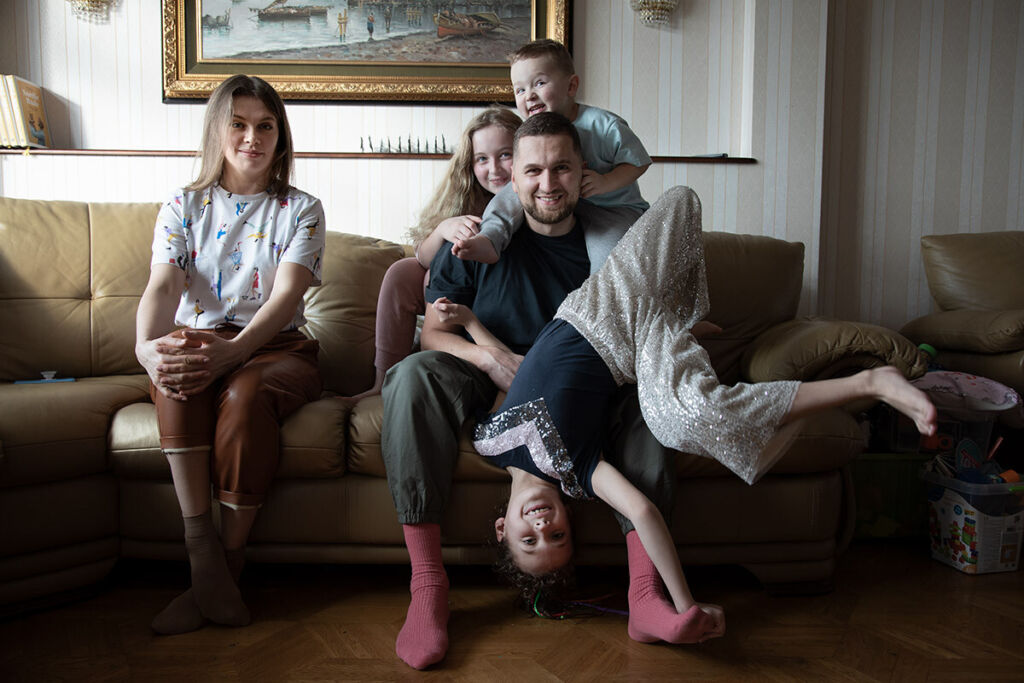
Even though we are quite informed about it in Russia, our society is still patriarchal. Women care about children more than their careers. I know women who manage to have both families and careers. But the majority takes care of children and does something related to the creative sphere. They are not as aimed at earning money. I work for Mail.ru now, the average age of employees there is lower than mine. And I see many girls working hard on par with guys and solving the tasks that I used to think were predominantly for men—for example, in programming.
I think the new generation tends to choose Western values, there’s a lot of information available nowadays. In this sense, our society is changing. And the paradigm that man is a breadwinner and woman stays at home with kids might be changing as well. But 20 years ago, it wasn’t something you really questioned.
Large family logistics
Now, getting back to the subject of our large family life. The most exhausting thing is probably logistics. You don’t fully understand it until you have to. And I did when I was on my “leave”.
You have to take the older children to the kindergarten and school. And when you’re alone with your toddler, you can’t leave him with anyone. So you have to take him with you. You always have to carry him while you’re running around the city.
A small child often wakes up at night and doesn’t let you sleep. But you still have to get up in the morning to take everyone to school, kindergarten, etc. My wife once fell asleep while driving.
Luckily, no one got hurt, she only fell asleep for a few seconds and woke up terrified.
We didn’t manage to stick to the everyday schedule, it was always a bit hectic. I was the first to wake up. I was usually tired because the youngest woke up at night moving around and kicking me. I tried and failed to get up at 7, fell asleep at 7:30, then got up at 7:50 again. We live quite close to the school, it only takes 15 minutes to drive. We had to leave the house at 8:15 at the latest. As a result, we were always late. You need to eat something and feed the kids while getting them ready. We usually did it together with my wife. While she was putting clothes on our sleeping middle child, I was looking for clothes for the eldest, she got dressed on her own. In the end, we’d somehow managed to leave the house and go to school.
It was kind of easier during the daytime… The eldest has extracurricular activities and the middle one is still in kindergarten. The eldest finishes school at 1 pm, you have to pick her up and take her to diving classes, for example. So after taking the children to school, you come home at 9:30–10 am. You have a coffee, do something around the house, and have to go back to pick up the eldest. After that, you take her to the extracurricular activities and wait for her because you don’t have enough time to go back home. Then you drive her home and go pick up the middle kid right after. And you have to have lunch, feed the kids, and do groceries in the meantime.
It is always a bit hectic at home, everybody does their own thing. And that’s often the reason why we go out. When the weather is nice and warm, we go for a walk or cycling. In the winter time, we visit our friends, go to a mall, or something of that sort. That’s how we escape the chaos at our place.
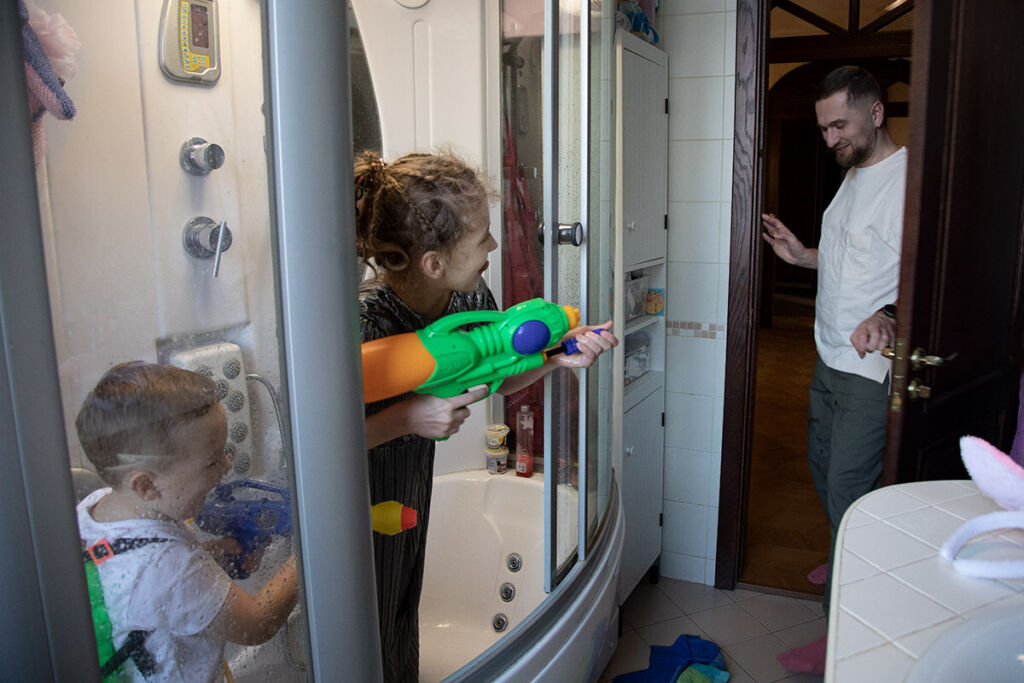
Our family doesn’t have any strict rules. For example, we don’t go to bed at the same time everyday. We come home late at night a lot. Kids fall asleep in the car. Luckily, the eldest can now wake up and walk to the apartment. Three years ago, though, we lived on the third floor, and the building didn’t have an elevator. And when we came home late, we had to carry the kids to the third floor one by one.
We try to have dinner together but it’s not that simple when you have little kids. You can’t expect them to sit still and just talk to you. They usually run around, grab a piece of food, and go run around again. But my wife and I try to sit down and have a conversation. She thinks she puts children to bed more often than me. But I’m pretty sure I do it as much as her. Our middle child is anxious, she always has been and still is really attached to my wife. And she always wants to sleep with mom. It often happens that all three of our kids fall asleep in our bed. It pisses me off sometimes—I simply don’t have a space to lay down! So I have to take them to their own beds…
Our everyday life is very busy, you don’t have any time for yourself. You get half an hour or an evening for yourself if you’re lucky. Sometimes you don’t even have energy left for bedtime stories. So audiobooks help a lot. The older kids can already listen to real books, Harry Potter, for example.
Personal space
Surely, there are moments when we get tired of each other and it becomes harder to control your emotions. But there is a thing called personal boundaries. Both children and adults have them. It’s fine when a kid needs to eat or go to the bathroom. But it’s not ok when they walk all over you—I mean literally… Sometimes you’re ready to play with them, sometimes not. Sometimes you’re not in the mood. It’s important to set and communicate these boundaries.
I get emotional at times. It’s not like we scream and fight every day. But it happens that I raise my voice. So when it does happen, it’s crucial to let your children know that you screamed at what they did, not at them. And you should politely ask them not to do it again.
It’s never quiet at our place. If you invite a person who doesn’t have kids to spend time with a large family, their head will probably explode because of the constant noise. My noise sensitivity is lower now. You just stop paying attention to certain things at some point.
Our friend once said, “Cleaning up after kids is like shoveling snow during a snow flurry.”
The only way to get some personal space is to run away. Into the woods, for example. I go there to run, and some people cycle. But you have to forget about personal space at home. They even barge into the bathroom sometimes. But we try to talk about it with the kids.
We know a lot of only-child families. We now realize that they aren’t able to understand our experience. We call them “only-child slackers” as an inside joke.
Children and people
When we moved into the flat we’re renting now, there was an 18-year-old girl and her mom living in the flat below us. The girl would sometimes come and complain about children running around and stomping. You can complain all you want but the truth is you can’t do anything about it. You can’t stop children from running, you can’t tie them to a chair. During her last visit, she came with a dog because the dog couldn’t sleep.
There are other stories like that. We once flew from Greece. We were sitting on the first or the second row, right after the business-class. There was one seat left in our row. And some guy, he was about 35, asked the flight attendant to swap his seat on the back to the one in our row. The flight was 4 hours, our kids were 2, 3, and 4 years old. Needless to say, they couldn’t sit still—they were screaming and fidgeting. I was sitting next to him and I saw him get more and more nervous. He turned to me at some point and asked, “Could you calm your children down? Or make them sit quietly?” I got so angry. What did he want me to do? What does it even mean to “calm your children down?”
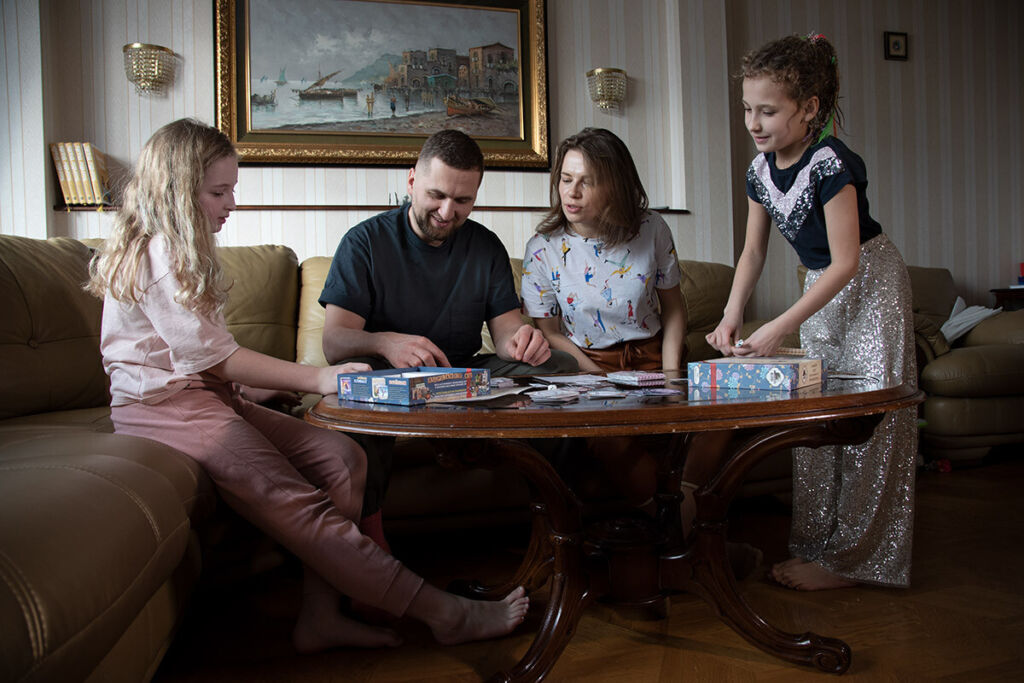
And once, I saw a Facebook post by a guy I knew. He wrote that it was a pity there weren’t any child-free flights. I unfollowed him right away. When I see things like this, it makes me really angry. They talk about kids as if they’re another species. In my opinion, it is very narrow-minded. It is usually people who have never been parents who say such things. And, from my point of view, if a person thinks this way, there is something wrong with them.
To me, feminism is…
I believe it’s important to teach your kids soft skills. That is, communication skills, empathy, emotional intelligence, the ability to express your thoughts, discuss, and make reasoned statements. But the main thing I want to teach my kids is that there are people with different opinions. You need to know how to determine causal relationships. You need to ask yourself why a person has certain values. Maybe it’s because of their family? Or they don’t have relevant experience? They have a different life story? When you understand that, you start treating people differently. You start being more empathetic and less judgemental.
I personally have always been able to be sincere and show vulnerability despite the patriarchal standards. But the hardest thing is communicating, listening to other people’s opinions, and accepting them. Talking is easy, understanding and reconsidering your values is way more difficult. But I think I still tried to listen to my wife, for example, when it came to our relationship and her worries. I used to think it was nothing, that she was just overthinking, and that I knew what was right. Now I understand it wasn’t “nothing”, it was actually important.
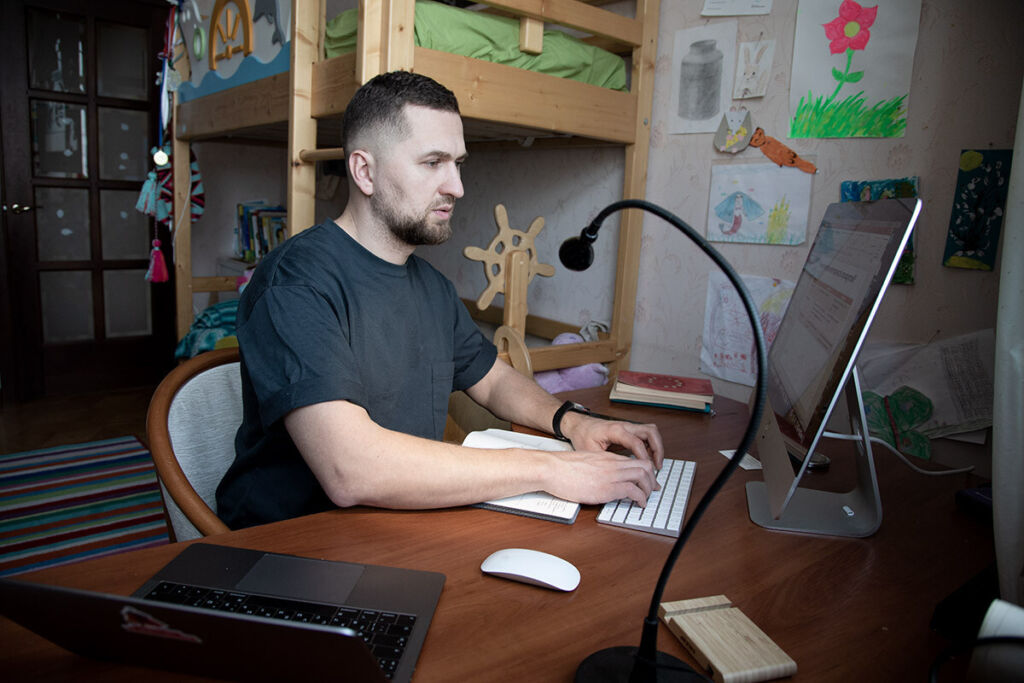
As for me, feminism doesn’t mean that women have to work as much as men. A woman can stay home but still put in as much effort as a working man. There are a lot of everyday tasks, especially when you have many kids. And there are tasks that are directly related to children: choosing extracurricular activities, schools and teaching methods, taking care of their health, and logistics in general. It takes a lot of energy.
We even tried to count how much we would have to spend on babysitters if my wife started working. And we realized we would only lose money. I have this model in my head: we are a family, we have the same goals. I invest my money, my wife invests her time. And you have to respect and appreciate that, you need to understand that it’s hard work. When I didn’t work and spent my time taking care of kids, I realized how hard it was. I totally changed my attitude towards the significance and difficulty of these tasks.
“I should have insisted on taking parental leave”
Six months later, I tried to go back to my old job, SAP. The HR manager found it weird. When I explained that I needed a break for family reasons, nobody really got it. Afterwards, I spoke to the HR consultant and he said, “You should’ve lied about trying to start your own business. You must never tell them you spent your time self-reflecting.”
I genuinely thought telling the truth was the right thing to do. I was interviewed by a girl. She looked quite experienced but she probably didn’t have a family. She had doubts about me. And because that girl was the one responsible for hiring all the company’s sales managers, her opinion was crucial. To be frank, I was shocked because I was sure I had a great background. I had excellent results, I was an amazing specialist. Was it the right decision to tell them the truth? Apparently not, because it stopped me from achieving my goal. It was a harsh reality check: nobody needed your sincerity there. It’s really tough in Russia: nobody wants to know about your family issues. That’s why they perceive men that decide to raise children as something extraordinary. Of course there are people that support your decision. But many say—or think—that you’re a loser, that you simply couldn’t handle your problems and gave up.
However,
young people, even if they work for big companies, are different from those that were born in the 1980s. They have different views on patriarchy, hierarchy, and money…
The new generation doesn’t always use money to measure their success. And they don’t always have the need to base their self-esteem on their careers.
Now I know I should have insisted on taking parental leave. We could have somehow reached an agreement on that. When you get employed, you mostly get valued as a worker, not as an individual. And you have to set those boundaries yourself. Your company will never tell you, “Listen, you have kids, why are you even here? Go home, spend some time with them!” That’s not how it works. Instead, you will hear, “Good job, keep going. Two more years, and everything will be great.” But it won’t be great because in two years, they’ll give you another project. Nothing will change until you learn to set your boundaries. It’s very hard, but you have to learn to keep your job and your life separate. I haven’t learnt to do it yet, but I keep trying.

The Different series is a project by Glasnaya and Novaya Gazeta about people who do not meet the standards of today’s Russian society, which leads to them becoming invisible to the majority. In Russia, it is customary not to notice, to ignore “others”, those who are different—and ignorance becomes the breeding ground for xenophobia and discrimination.
Those who are different are often afraid to put themselves out there. But there are more and more people who have already overcome their fears. Those are women and men breaking stereotypes and the framework of patriarchy.
The material is published jointly with Novaya Gazeta.

